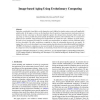Free Online Productivity Tools
i2Speak
i2Symbol
i2OCR
iTex2Img
iWeb2Print
iWeb2Shot
i2Type
iPdf2Split
iPdf2Merge
i2Bopomofo
i2Arabic
i2Style
i2Image
i2PDF
iLatex2Rtf
Sci2ools
103
click to vote
CGF
2008
2008
Image-based Aging Using Evolutionary Computing
Aging has considerable visual effects on the human face and is difficult to simulate using a universally-applicable global model. In this paper, we focus on the hypothesis that the patterns of age progression (and regression) are related to the face concerned, as the latter implicitly captures the characteristics of gender, ethnic origin, and age group, as well as possibly the person-specific development patterns of the individual. We use a data-driven framework for automatic image-based facial transformation in conjunction with a database of facial images. We build a novel parameterized model for encoding age-transformation in addition with the traditional model for face description. We utilize evolutionary computing to learn the relationship between the two models. To support this work, we also developed a new image warping algorithm based on non-uniform radial basis functions (NURBFs). Evolutionary computing was also used to handle the large parameter space associated with NURBFs. ...
CGF 2008 | Computer Graphics | Image-based Facial Transformation | Universally-applicable Global Model |
Related Content
| Added | 09 Dec 2010 |
| Updated | 09 Dec 2010 |
| Type | Journal |
| Year | 2008 |
| Where | CGF |
| Authors | Daniel Hubball, Min Chen, Phil W. Grant |
Comments (0)

